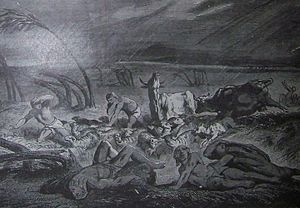I recently got into a conversation about infinities with humblesmith spanning a
recent post on his blog and an
old post on mine. He made some interesting comments on my post and it got my mind working a bit. As I was writing my reply, I realized it was a bit long for a comment so I thought it would be suitable as a post on it's own instead. It will actually spawn a couple of posts, as my long time readers will know, I love talking about infinities.
In this post, I want to address the claim made in the
Kalam cosmological argument (and elsewhere) that "an actual infinite cannot exist". I'm not 100% sure what is meant by this, but it seems to be referencing the limit definition of infinities. So let's take a moment to discuss limits.
Infinity as a Limit
Let's say you have a series of numbers, for example:
1/
2,
2/
3,
3/
4,
4/
5,...
The pattern here is simply that the n
th number is
n/
n+1. There are a few interesting things about this sequence, first, no matter how large 'n' is, the fraction is less than 1. Secondly, you can get as close to 1 as you wish by picking a large enough n. (for example, if you wish to be less than 0.01 away from 1, you can do it with n=100). We say that 1 is the limit of this sequence, the fact that we never get there is irrelevant, what we care about is that we can get as close as we wish.
So that's how a limit to a finite number works, what about limits to infinity? Simply put, we say a sequence has infinity as a limit if it grows without bound. In other words, for every number A there is some integer n such that every number in the sequence past the n
th is bigger than A. Take for example the sequence of the powers of 2 (2,4,8,16,...), no matter how big a number you pick for A, there is some point when the rest of the sequence is bigger than A. So the limit of the sequence is infinity.
We 'Never' Reach Infinity
I'm pretty sure that this is what people are talking about when they say actual infinite doesn't exist. To borrow William Lane Craig's example in the
post that started this whole thing, suppose I am piling up baseball cards one at a time and I continue doing this forever. We can describe the number of cards in the pile as a sequence (1,2,3,4,5,6,...), it's a pretty boring sequence, but it's trivial to see that the limit is infinity. However, there is no point in time when there are an infinite number of cards on the table, therefore, infinity doesn't exist. I am pretty sure this is the idea that is referenced with the statement "an actual infinity doesn't exist".
There is something to this, and it is a very interesting topic for investigation. We say the limit is infinity, and yet we never reach it at any point on the actual timeline. But this is the way it has to be, because once you pick a specific time on the timeline and examine it to see whether or not there is an infinite number of cards, you have cut off the sequence. You have changed the situation to a finite limit of finite numbers, of course the result will be finite. So it is true that in this situation there is never a moment where we have a pile containing an infinite number of things. In this setting perhaps it is reasonable to say that an actual infinity doesn't exist, but to extend that to all situations where an infinity might come up is a bit hasty.
Part of the difficulty here is that infinities can do some crazy things, and you have to be really careful with them, especially when you have multiple infinities interacting with each other, and that's sorta what we have here. "Never" and "forever" are both words that may or may not contain an implicit infinity, depending on how they are used. When we say that we will continue doing this "forever", do we really mean forever or do we mean for an arbitrarily large finite amount of time? What about never, is this referring to an arbitrarily large finite time or a limit? My intuition suggests that never is talking about an arbitrarily large finite time and forever is really talking about in the limit, in this sense we have a disconnect. [Although I'm a mathematician, so who knows how my intuition will line up with yours :)]
Let's Dispense with the Cards
Using the example of piling up cards does seem to illustrate some points, but it also creates some problems (Where do we get the cards? Does this assume infinity from the start? Where do we put them? Will they collapse into a black hole eventually? etc) So let's shift our example to just counting up time that has passed. We will count up seconds "forever", much of what we said above with the cards will transfer over, do we ever get to a point where we have counted an infinite number of seconds? No, we don't for the same reason as above, once we look at a point in time we have restricted ourselves to the finite. What if we step outside of our own universe and look at the whole thing all at once? I would say that in this case we can say that an infinite number of seconds is possible.
One of the things that humblesmith challenged me with is that my argument is circular, and I think this is a good spot to address it. In a sense I have started by assuming infinity is possible (when I said that we could count seconds forever), and now I have concluded that infinities can exist. In a sense he is right, this only works if forever exists which we assumed from the start. However, the key here is that I'm just trying to argue that this is a possibility. As far as I can tell, there are two possibilities, the universe ends at some point in the future (like a big crunch) or it doesn't (heat death for example). If the big crunch happens then my argument wouldn't work, and even from a perspective outside of our universe with a broad view we would not be able to observe an infinity. But if there is heat death (or some less boring eternity in our universe) then we could see infinity from the outside perspective. But again, I'm only arguing for this to be a possibility, so even if it doesn't work in our universe, I think we can argue that it could exist in
some universe. Arguing that something is possible is much easier than arguing that something is impossible.
Infinite Regress
 |
Turtles all the way down
(Photo credit: Wikipedia) |
Often when this comes up the claim is that an infinite regress is impossible. As far as I can tell, the argument for this is some version of the baseball card example above. However, an infinite regress of causes is more akin to the infinite number of seconds than the infinite number of physical objects. The only difference is that we are talking about an infinity going backward in time rather than forward. This might seem like a bit of a leap, but it's honestly not that different. By looking forward in time, we can see that an infinite number of moments is possible, why can't we just orient causation backward and have the same thing. Once again, I am not claiming that this is how it is, or that this happened, just that this is a possibility. Remember, the apologist claim is that an infinite regress is impossible, the opposite claim is not that is did happen, just that it could have happened. My assertion is simply that an infinite regress is still on the table.
Any Apologists Reading?
I have seen the claim that an infinite regress is impossible in many places. However, I have never actually seen it explicitly spelled out why that is the case. When it is hinted at, it always seems to be referencing the limit definition of infinity, so that is what I ran with. If there is a different argument as to why please let me know. I'd love to check it out, and if it gives me another excuse to write about infinities, all the better.






























